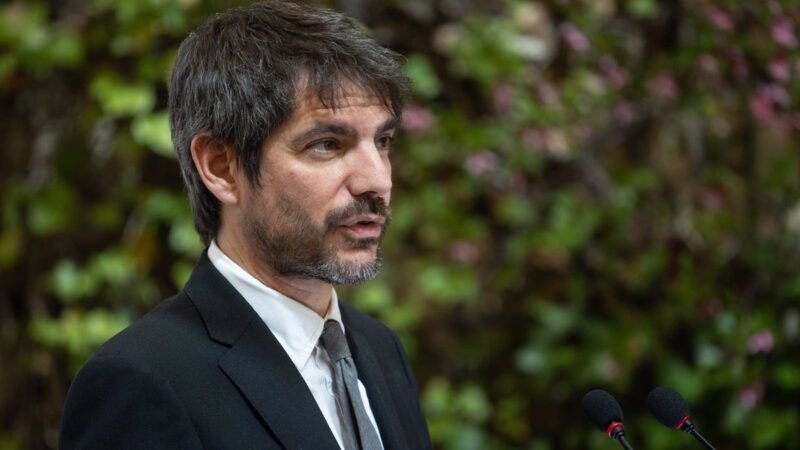Detén los asesinatos por nuestra civilización

The journalist and writer Es C. Martínez opens in the novel with the «thriller» «Si te digo mi nombre, tendré que matarte» (Ediciones B), a psychological exploration with humorous touches around the mind of a serial killer in a Madrid populated by corrupt politicians, ruthless managers, and powers that pull the strings from the shadows.
-«We no longer kill because we are civilized,» The author emphasized in an interview with Europe Press, despite a thin line that separates morality from barbarism. «Centuries ago, death was much more common, but today we face a constant moral dilemma,» he added.
In fact, the budding writer ironically points out that, although he cannot kill anyone, «In certain circumstances, a human being can lose his mind.» In the case of his novel, those «mitigating factors» arise from the cruelty and hypocrisy of characters like the businessman and president of a football team, Valentino Ruigémez, or the boss of successful «yellow» programs, Anabel González.
As Martín explained: «If I tell you my name, I’ll have to kill you» does not fit the classic canon of the genre. «The idea of writing a thriller comes from my love for the genre. I’ve always been fascinated by thrillers, but I didn’t want to write one focused on the investigator. I preferred to explore the perspective of the criminal,» he said.
However, the novel is not limited to the narration of crimes because, in a certain resemblance to works like «Psycho American,» there is a direct dialogue between the protagonist and the reader, almost justifying his actions. «I imagined the character speaking to me, almost challenging me: ‘I’m kind, I’m ready, I’m famous, do you have a problem?'» Martínez explained about the construction of his protagonist.
The journalist clarifies that, despite the despicable nature of his character, the intention is not to justify his actions but to explore his deeper motivations. «He is a criminal, yes, but he is also a human being seeking approval and acceptance. Deep down, he wants the reader to like him, even if they don’t recognize him,» he admitted, emphasizing that this behavior reflects the contradictions in many social behaviors.
In this way, the book also offers a reflection on the concept of «justice.» «The bastard is not always the one who commits offenses, and there is a reflection on who is truly more psychopathic: the one who kills and seeks justification or the one who hurts and feels no remorse.»
The protagonist of his novel, a man of the 80s and 90s generation, is aware of his superiority in many ways, which leads him to question the figure of power. «We are the best generation of all, we are more prepared, we are smarter, but in the end, the responsible ones are the worst,» he regretted.
Therefore, he believes that in the present times, a society living «in a disturbed world» has been generated. «Sometimes, the system itself pushes us to act irrationally, and this is the line I try to explore in my novel,» he said.
Martínez acknowledged that his work has a personal component. «I wrote the novel as a form of revenge against myself; I was going through a very dark time in my life. Putting it into words helped me release all the anger and frustration. I didn’t think it would be a success, but it showed me that I can do this,» he said, also explaining that his experience in the media helped create a fictional yet unsettling world.
In his literary future, the author is clear that he will not stop at this first work. «I want to keep writing. It’s not a threat, it’s a reality,» he said, thanking the support of the Penguin Random House group and revealing that he is already working on a second novel.
«The writing process is captivating, and it is a great pleasure to finish a session, even if I don’t know if what I’ve done is good or bad,» he celebrated. Among his literary influences, Martínez mentions Eduardo Mendoza and the work of Bret Easton Ellis, especially «American Psycho,» or the significance of other classics like «The Great Gatsby» by Fitzgerald.
FUENTE






![La trilogía esencial de Quinqui Cinema llega a Flixolé.[embed]https://www.youtube.com/watch?v=orhsokajm4[/embed]](https://nuevaprensa.info/wp-content/uploads/2025/04/1743681739_La-trilogia-esencial-de-Quinqui-Cinema-llega-a-Flixoleembedhttpswwwyoutubecomwatchvorhsokajm4embed-800x450.jpg)
